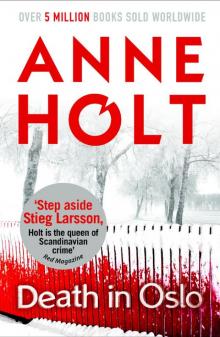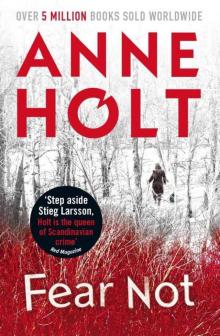Hanne Wilhelmsen - 01 - The Blind Goddess Read online
The Blind Goddess
Hanne Wilhelmsen [1]
Anne Holt
Simon and Schuster (2011)
* * *
Rating: ★★★☆☆
Tags: General, Mystery Detective, Suspense, Women Sleuths, Fiction
Generalttt Mystery Detectivettt Suspensettt Women Sleuthsttt Fictionttt
* * *
**From the internationally acclaimed author of *1222* comes the suspenseful tour de force that started it all - the unforgettable debut of Inspector Hanne Wilhelmsen in a stunning literary skein of corruption, drugs, and murder.**Norwegian author Anne Holt has become one of the hottest writers of dark, sophisticated mystery fiction in the world today. *Blind Goddess* is the international bestseller that introduced readers to the brilliant and enigmatic Inspector Hanne Wilhelmsen, whose fascinating evolution over eight books lies at the heart of the series' success.
* Blind Goddess* opens with the discovery of a dead drug dealer on the outskirts of the Norwegian capital of Oslo. Within days Hansa Larsen, a lawyer of the shadiest kind, is found shot to death, and police officers HÅkon Sand and Hanne Wilhelmsen establish a link between the two crimes. The case is soon complicated by seemingly unrelated developments, including a coded message hidden in the murdered lawyer's apartment, ominous rumors from the drug underworld, and a Dutch suspect found wandering confused and bloodied in central Oslo who refuses to talk to anyone but an obscure civil lawyer. As the officers investigate, they uncover a massive network of corruption involving the highest level of government whose exposure may well get them killed.
THE FIRST BOOK IN EDGAR-NOMINATED ANNE HOLT’S INTERNATIONAL BESTSELLING MYSTERY SERIES FEATURING DETECTIVE HANNE WILHELMSEN, LAST SEEN IN 1222
A small-time drug dealer is found battered to death on the outskirts of the Norwegian capital, Oslo. A young Dutchman, walking aimlessly in central Oslo covered in blood, is taken into custody but refuses to talk. When he is informed that the woman who discovered the body, Karen Borg, is a lawyer, he demands her as his defender, although her specialty is civil, not criminal, law. A couple of days later, Hansa Larsen, a lawyer of the shadiest kind, is found shot to death. Soon police officers Håkon Sand and Hanne Wilhelmsen establish a link between the two killings. They also find a coded message hidden in the murdered lawyer’s apartment. Their maverick colleague in the drugs squad, Billy T., reports that a recent rumor in the drug underworld involves drug-dealing lawyers. Now the reason why the young Dutchman insisted on having Karen Borg as a defender slowly dawns on them: since she was the one to find and report the body, she is the only Oslo lawyer that cannot be implicated in the crime. As the officers investigate, they uncover a massive network of corruption leading to the highest levels of government. As their lives are threatened, Hanne and her colleagues must find the killer and, in the process, bring the lies and deception out into the open.
“Wherever Hanne shows up next, my advice is to follow that wheelchair.”
—MARILYN STASIO, THE NEW YORK TIMES BOOK REVIEW
“With her doubting internal dialogue and sharp wit, Wilhelmsen is neither too good, nor too bad and brooding, to be true—a nice find in the mystery world.”
—THE CLEVELAND PLAIN DEALER
ANNE HOLT has worked as a journalist and news anchor and spent two years working for the Oslo Police Department before founding her own law firm and serving as Norway’s minister of justice in 1996 and 1997. She is the author of 1222. Her books have been translated into twenty-five languages. She lives in Oslo with her family.
MEET THE AUTHORS, WATCH VIDEOS AND MORE AT
SimonandSchuster.com
THE SOURCE FOR READING GROUPS
COVER PHOTOGRAPH © ALASKA STOCK/CORBIS; AUTHOR IMAGE © BY JO MICHAEL
ALSO BY ANNE HOLT
1222
Thank you for purchasing this Scribner eBook.
Sign up for our newsletter and receive special offers, access to bonus content, and info on the latest new releases and other great eBooks from Scribner and Simon & Schuster.
or visit us online to sign up at
eBookNews.SimonandSchuster.com
Scribner
A Division of Simon & Schuster, Inc.
1230 Avenue of the Americas
New York, NY 10020
www.SimonandSchuster.com
This book is a work of fiction. Names, characters, places, and incidents either are products of the author’s imagination or are used fictitiously. Any resemblance to actual events or locales or persons, living or dead, is entirely coincidental.
Copyright © 1993 by Anne Holt
English language translation copyright © 2012 by Tom Geddes
Originally published in 1993 in Norwegian as Blind gudinne
Published by agreement with Salomonsson Agency.
All rights reserved, including the right to reproduce this book or portions thereof in any form whatsoever. For information address Scribner Subsidiary Rights Department, 1230 Avenue of the Americas, New York, NY 10020.
First Scribner trade paperback edition June 2012
SCRIBNER and design are registered trademarks of The Gale Group, Inc., used under license by Simon & Schuster, Inc., the publisher of this work.
The Simon & Schuster Speakers Bureau can bring authors to your live event. For more information or to book an event contact the Simon & Schuster Speakers Bureau at 866-248-3049 or visit our website at www.simonspeakers.com.
Designed by Jill Putorti
ISBN 978-1-4516-3475-4
ISBN 978-1-4516-3476-1 (pbk)
ISBN 978-1-4516-3490-7 (ebook)
BLIND
GODDESS
CONTENTS
Monday 28 September, and Earlier
Tuesday 29 September
Thursday 1 October
Friday 2 October
Monday 5 October
Wednesday 7 October
Sunday 11 October
Monday 12 October
Tuesday 13 October
Thursday 15 October
Friday 16 October
Monday 19 October
Friday 23 October
Monday 26 October
Thursday 29 October
Tuesday 3 November
Friday 6 November
Saturday 7 November
Monday 9 November
Tuesday 10 November
Wednesday 11 November
Thursday 12 November
Friday 13 November
Thursday 19 November
Friday 20 November
Saturday 21 November
Monday 23 November
Tuesday 24 November
Wednesday 25 November
Friday 27 November
Saturday 28 November
Sunday 29 November
Monday 30 November
Tuesday 1 December
Tuesday 8 December
Thursday 10 December
Monday 14 December
About the Author
The man was dead. Conclusively, beyond all reasonable doubt. She could tell instantly. Afterwards she couldn’t really explain her absolute certainty. Maybe it was the way he was lying, his face hidden by the rotting leaves, a dog turd right by his ear. No drunk with any self-respect lies down next to a dog turd.
She rolled him over carefully. His entire face was missing. It was impossible to recognise anything of what must once have been a person with an individual identity. The chest was a man’s, with three holes in it.
She had to turn away and retch violently, bringing up nothing but a bitter taste in her mouth and painful cramps in her stomach, letting the corpse fall forward again. She realised too late that she ha
d moved it just enough for the head to land in the excrement, which was now spread all over the drenched dark-blond hair. That was the sight that finally made her throw up, spattering him with the tomato-coloured contents of her stomach. It seemed almost like a derisive gesture of the living towards the dead. The peas from her dinner weren’t yet digested, and they lay there like toxic-green full stops over the dead man’s back.
Karen Borg started running. She called her dog, and put it on the lead she always carried mostly for the sake of appearances. The dog scampered excitedly alongside her until it realised that its mistress was sobbing and gasping, and then it decided to contribute its own anxious whining and whimpering to a chorus of lamentation.
They ran and ran and ran.
MONDAY 28 SEPTEMBER, AND EARLIER
Police headquarters in Oslo, Grønlandsleiret, number 44. An address with no historical resonance; not like 19 Møllergata, the old police headquarters, and very different from Victoria Terrasse, with its grand government buildings. Number 44 Grønlandsleiret had a dreary ring to it, grey and modern, with a hint of public service incompetence and internal wranglings. A huge and slightly curved building, as if the winds had been too strong to withstand, it stood framed by a house of God on one side and a prison on the other, with an area of demolished housing on Enerhaugen at the rear, and only a broad expanse of grass fronting it as protection against the city’s most polluted and trafficky streets. The entrance was cheerless and forbidding, rather small in proportion to the two-hundred-metre length of the façade, squashed in obliquely, almost concealed, as if to make approach difficult, and escape impossible.
At half past nine on Monday morning Karen Borg, a lawyer, came walking up the incline of the paved path to this doorway. The distance was just far enough to make your clothes feel clammy. She was sure the hill must have been constructed deliberately so that everyone would enter Oslo police headquarters in a slight sweat.
She pushed against the heavy metal doors and went into the foyer. If she’d had more time, she’d have noticed the invisible barrier across the floor. Norwegians bound for foreign shores were queueing for their red passports on the sunny side of the enormous room. On the north side, packed in beneath the gallery, were the dark-skinned people, apprehensive, hands damp with perspiration after hours of waiting to be told their fate in the Police Immigration Department.
But Karen Borg was late. She cast a glance up to the gallery round the walls: blue doors and linoleum floor on one side, and yellow on the other, southern, side. On the west side two tunnel-like corridors in red and green disappeared into nothingness. The atrium extended seven floors in height. She would observe later how wasteful the design was: the offices themselves were tiny. When she was more familiar with the building she would discover that the important facilities were on the sixth floor: the commissioner’s office and the canteen. And above that, as invisible from the foyer as the Lord in His heaven, was the Special Branch.
“Like a kindergarten,” Karen Borg thought as she became aware of the colour coding. “It’s to make sure everyone finds their way to the right place.”
She was heading for the second floor, blue zone. The three lifts had conspired simultaneously to make her walk up the stairs. Having watched the floor indicators flash up and down for nearly five minutes without illuminating “Ground,” she had allowed herself to be persuaded.
She had the four-figure room number jotted on a slip of paper. The office was easy to find. The blue door was covered in paste marks where attempts had been made to remove things, but Mickey Mouse and Donald Duck had stubbornly resisted and were grinning at her with only half their faces and no legs. It would have looked better if they’d been left alone. Karen Borg knocked. A voice responded and she went in.
Håkon Sand didn’t appear to be in a good mood. There was an aroma of aftershave, and a damp towel lay over the only chair in the room apart from the one occupied by Sand himself. She could see his hair was wet.
He picked up the towel, threw it into a corner, and invited her to sit down. The chair was damp. She sat anyway.
Håkon Sand and Karen Borg were old friends who never saw each other. They always exchanged the customary pleasantries, like How are you, it’s been a long time, we must have dinner one day. A regular routine whenever they happened to meet, in the street or at the homes of mutual friends who were better at keeping in touch.
“I’m glad you came. Very pleased, in fact,” he said suddenly. It didn’t look like it. His smile of welcome was strained and tired after twenty-four hours on duty.
“The guy’s refusing to say anything at all. He just keeps repeating that he wants you as his lawyer.”
Karen Borg lit a cigarette. She defied all the warnings and smoked Prince Originals. The “Now I’m smoking Prince too” type, with maximum tar and nicotine and a frightening scarlet warning label from the Department of Health. No one cadged a smoke from Karen Borg.
“It ought to be easy enough to make him see that’s impossible. For one thing, I’m a witness in the case, since I was the one who found the body, and second, I’m not proficient in criminal law. I haven’t handled criminal cases since my exams. And that was seven years ago.”
“Eight,” he corrected her. “It’s eight years since we took our exams. You came third in our year, out of a hundred and fourteen candidates. I was fifth from the bottom. Of course you’re proficient in criminal law if you want to be.”
He was annoyed, and it was contagious. She was suddenly aware of the atmosphere that used to come between them when they were students. Her consistently glowing results were in stark contrast to his own stumbling progress towards the final degree exam that he would never even have scraped a pass in without her. She had pushed and coaxed and threatened him through it all, as if her own success would be easier to bear with this burden on her shoulders. For some reason which they could never fathom, perhaps because they’d never talked about it, they both felt she was the one who had the debt of gratitude to him, and not the other way round. It had irritated her ever since, this feeling of owing him something. Why they had been so inseparable throughout their student years was something nobody understood. They had never been lovers, never so much as a little necking when drunk, but a mismatched pair of friends, quarrelsome yet bound by a mutual concern that gave them an invulnerability to many of the vicissitudes of student life.
“And as for you being a witness, I don’t give a shit about that right now. What’s more important is to get the man to start talking. It’s obvious he won’t cooperate until he gets you as his defence counsel. We can think again about the witness stuff when we have to. That’ll be a good while yet.”
“The witness stuff.” His legal terminology had never been particularly precise, but even so Karen Borg found this grated on her. Håkon Sand was a police attorney, and his job was to uphold the law. Karen Borg wanted to go on believing the police took the law seriously.
“Can’t you talk to him anyway?”
“On one condition. You give me a credible explanation of how he knows who I am.”
“That was actually my fault.”
Håkon smiled with the same feeling of relief he’d had whenever she’d explained something he’d read ten times before without comprehending. He fetched two cups of coffee from the anteroom.
Then he told her the story of the young Dutch national whose only contact with working life—according to reports so far—had been drug trafficking in Europe. How this Dutchman, now sitting as tight-lipped as a clam waiting for Karen Borg in one of the toughest billets in Norway, the custody cells in Oslo police headquarters, knew exactly who Karen Borg was—a thirty-five-year-old very successful commercial lawyer totally unknown to the general public.
* * *
“Bravo Two-Zero calling Zero-One!”
“Zero-One to Bravo Two-Zero, go ahead.”
The police officer spoke in hushed tones, as if he were expecting a confidential secret. Far from it. He was on duty in the o
perations room. It was a large open space with a shelved floor in which raised voices were taboo, decisiveness a virtue, and economy of expression vital. The duty shift of uniformed officers sat perched above the theatre floor, with an enormous map on the opposite wall to chart the scene of the main action, the city of Oslo itself. The room was as centrally positioned in the police headquarters building as it could be, with not a single window looking out onto the restless Saturday evening. The city night made its presence felt in other ways: by radio contact with the patrol cars and a supportive 002 number for the assistance of the public of Oslo in their moments of greater or lesser need.
“There’s a man sitting in the road on Bogstadsveien. We can’t get anything out of him, his clothes are covered in blood, but he doesn’t look injured. No ID. He’s not putting up any resistance, but he’s obstructing the traffic. We’re bringing him in.”
“Okay, Bravo Two-Zero. Report when you’re back on patrol. Received Zero-One. Over and out.”
* * *
Half an hour later the suspect was standing at the reception desk. His clothes were certainly bloody: Bravo Two-Zero had been right about that. A young rookie was searching him. With his unmarked blue epaulettes lacking even a single stripe as insurance against all the vilest jobs, he was terrified of so much possibly HIV-infected blood. Protected by rubber gloves, he pulled the open leather jacket off the arrested man. Only then did he see that his T-shirt had originally been white. His denim jeans were covered in blood too, and he had a general air of self-neglect.

 A Grave for Two
A Grave for Two Dead Joker
Dead Joker Death of the Demon: A Hanne Wilhelmsen Novel
Death of the Demon: A Hanne Wilhelmsen Novel Punishment aka What Is Mine
Punishment aka What Is Mine Beyond the Truth
Beyond the Truth Death in Oslo
Death in Oslo The Blind Goddess
The Blind Goddess What Never Happens
What Never Happens 1222
1222 In Dust and Ashes
In Dust and Ashes Odd Numbers
Odd Numbers What is Mine
What is Mine What Dark Clouds Hide
What Dark Clouds Hide Blessed Are Those Who Thirst
Blessed Are Those Who Thirst Fear Not
Fear Not No Echo
No Echo Hanne Wilhelmsen - 01 - The Blind Goddess
Hanne Wilhelmsen - 01 - The Blind Goddess